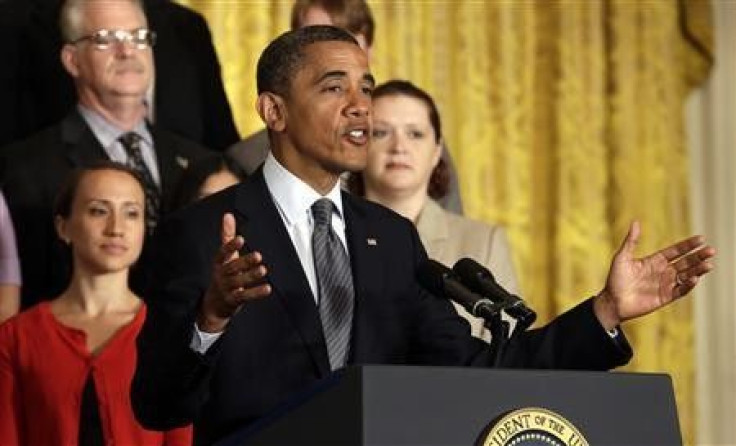How Much Would Middle Class Save With Bush Tax Cut Extension?

President Barack Obama on Monday officially called for a one-year extension of the Bush tax cuts for middle-class families while allowing those cuts for the wealthy to expire, a strategy that has previously been scorned by Republicans who argue rescinding those lower rates for the nation's job creators will only further damage the country's already fragile economy.
Our biggest challenge right now isn't to reclaim all the jobs we lost in the recession. It's to reclaim the security so many middle- class Americans have lost, Obama said in an address from the White House's East Room early Monday afternoon. Members of the other party believe prosperity comes from the top down. I disagree.
As part of a campaign push designed to amplify the president's message on tax fairness, expected to be a major talking point in his re-election battle, Obama is proposing a one-year extension of those tax cuts for families earning less than $250,000 a year. Congressional Republicans, on the other hand, are fighting to extend those tax cuts across the board, even though House Republicans have already admitted they have no plans to pay for that extension, despite their professed commitment to fiscal responsibility and lowering the federal deficit.
But the president's plan would extend those cuts for a wide majority of American taxpayers. Only 1.9 percent of Americans -- those who earn more than a quarter of a million dollars per year -- would lose any portion of the Bush tax cuts in 2013 under Obama's proposal.
So just how much would the poor and middle class save under the Democratic plan? According to an analysis from the left-leaning Citizens for Tax Justice, using data from the Institute on Taxation and Economic Policy -- the figures also factor in savings from income tax cuts such as the Earned Income Tax Credit and the Child Tax Credit, which Obama extended along with the Bush tax cuts in 2010 -- the savings range from between a few hundred dollars for the poor, to thousands for the middle class.
Specifically, the poorest 20 percent (those with an average income of $13,850) would keep their average tax cut of $270 with the extension. The second 20 percent (about $27,910 income) would save about $630; and the middle 20 percent of earners ($44,880) would save $880.
The upper 40 percent would continue to save thousands of dollars each year: those earning an average of $73,700 would keep receiving a cut of $1,550, while the next bracket up -- those earning about $127,560 -- would reap a $3,740 cut.
The Republican plan, according to the same analysis, would actually tax the lowest-income group about $150 more per year. Moreover, the top 1 percent of earners would receive tax cuts averaging $70,790 under the GOP plan, giving millionaires an additional $50,000 annually than they would receive under the Democratic proposal, if the Obama administration chose to extend the tax cuts to that demographic. As of now, the president is adamantly against extending those cuts to the wealthy.
But it's also worth noting that the wealthiest Americans would continue to receive some savings, even if the tax cuts are only extended to the middle and working class. For instance, a family that makes $1 million per year would pay lower taxes on the first $250,000 of their income, but pay a higher, Clinton-era rate on their remaining income.
With the passage of the so-called Bush Tax Cuts, implemented through the Economic Growth and Tax Relief Reconciliation Act of 2001 and the Jobs and Growth Tax Relief Reconciliation Act of 2003, the United States' marginal tax rates were significantly lowered and divided into six brackets: 10 percent, 15 percent, 25 percent, 28 percent, 33 percent and 35 percent. Prior to 2001, the marginal tax rates were 15 percent, 28 percent, 31 percent, 36 percent and 39.6 percent.
Obama has pointed to eliminating the tax cuts for the wealthy as one major step toward the goal of lowering the federal government's massive debt, which topped $15 trillion last November. In August 2010, the Congressional Budget Office (CBO) estimated that extending cuts for the 2011-2020 time period would add another $3.3 trillion to the national debt, a finding that was echoed by the non-partisan Pew Charitable Trusts and the non-partisan Congressional Research Service.
While extending those tax cuts solely for incomes below $250,000 would also increase the debt by about $2.2 trillion in the next decade, Obama and his supporters argue it would ultimately benefit the U.S. economy since the poor and middle class are more likely to reinvest their savings directly into the market. In comparison, the wealthiest Americans are more likely to save the money they would receive from the tax cut extension.
Some policy groups have attributed much of the rise in income inequality to the Bush tax cuts, arguing it shifted the tax burden from the rich to the middle and working classes. In 2010, in the thick of yet another partisan debate surrounding the tax cut extensions, the Center on Budget and Policy Priorities, citing data from the CBO, wrote that extending the high-income tax cuts would be the least effective way of stimulating the economy.
It would have only a small effect on the current weak economy, while posing a substantial risk that Congress would continue extending the tax cuts and even make them permanent, creating much larger deficits for years to come, the non-partisan think tank explained.
© Copyright IBTimes 2024. All rights reserved.











